
The General is a 1926 American silent slapstick Western action comedy film released by United Artists. It was inspired by the Great Locomotive Chase, a true story of an event that occurred during the American Civil War. The story was adapted from the 1889 memoir The Great Locomotive Chase by William Pittenger. The film stars Buster Keaton, who also directed it along with Clyde Bruckman.
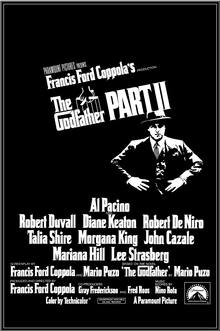
The Godfather Part II is a 1974 American epic crime film. The film is produced and directed by Francis Ford Coppola, loosely based on the 1969 novel The Godfather by Mario Puzo, who co-wrote the screenplay with Coppola. It is both a sequel and a prequel to the 1972 film The Godfather, presenting parallel dramas: one picks up the 1958 story of Michael Corleone, the new Don of the Corleone family, protecting the family business in the aftermath of an attempt on his life; the prequel covers the journey of his father, Vito Corleone, from his Sicilian childhood to the founding of his family enterprise in New York City. The ensemble cast also features Robert Duvall, Diane Keaton, Talia Shire, Morgana King, John Cazale, Mariana Hill, and Lee Strasberg.

Some Like It Hot is a 1959 American crime comedy film directed, produced and co-written by Billy Wilder. It stars Marilyn Monroe, Tony Curtis and Jack Lemmon, with George Raft, Pat O'Brien, Joe E. Brown, Joan Shawlee and Nehemiah Persoff in supporting roles. The screenplay by Wilder and I. A. L. Diamond is based on a screenplay by Robert Thoeren and Michael Logan from the 1935 French film Fanfare of Love. The film is about two musicians who disguise themselves by dressing as women to escape from mafia gangsters whom they witnessed committing a crime.
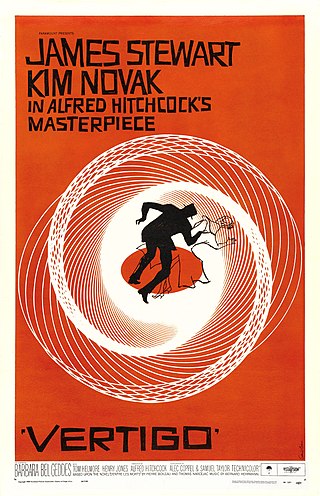
Vertigo is a 1958 American psychological thriller film directed and produced by Alfred Hitchcock. The story was based on the 1954 novel D'entre les morts by Boileau-Narcejac. The screenplay was written by Alec Coppel and Samuel A. Taylor. The film stars James Stewart as former police detective John "Scottie" Ferguson, who has retired because an incident in the line of duty has caused him to develop acrophobia and vertigo, a false sense of rotational movement. Scottie is hired by an acquaintance, Gavin Elster, as a private investigator to follow Gavin's wife, Madeleine, who is behaving strangely.
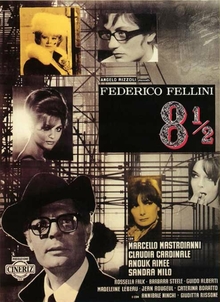
8+1⁄2 is an Italian 1963 avant-garde surrealist comedy-drama film directed and co-written by Federico Fellini. The metafictional narrative centers on Guido Anselmi, played by Marcello Mastroianni, a famous Italian film director who suffers from stifled creativity as he attempts to direct an epic science fiction film. Claudia Cardinale, Anouk Aimée, Sandra Milo, Rossella Falk, Barbara Steele, and Eddra Gale portray the various women in Guido's life. The film is shot in black and white by cinematographer Gianni Di Venanzo and features a soundtrack by Nino Rota, with costume and set designs by Piero Gherardi.

The Apu Trilogy comprises three Indian Bengali-language drama films directed by Satyajit Ray: Pather Panchali (1955), Aparajito (1956) and The World of Apu (1959). The original music for the films was composed by Ravi Shankar.
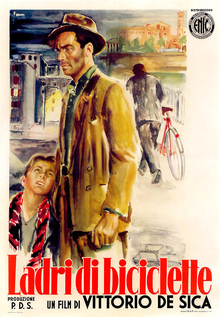
Bicycle Thieves, also known as The Bicycle Thief, is a 1948 Italian neorealist drama film directed by Vittorio De Sica. It follows the story of a poor father searching in post-World War II Rome for his stolen bicycle, without which he will lose the job which was to be the salvation of his young family.

Tokyo Story is a 1953 Japanese drama film directed by Yasujirō Ozu and starring Chishū Ryū and Chieko Higashiyama, about an aging couple who travel to Tokyo to visit their grown children.
Sight and Sound is a monthly film magazine published by the British Film Institute (BFI). It conducts the well-known, once-a-decade Sight and Sound Poll of the Greatest Films of All Time, ongoing since 1952.

David Thomson is a British film critic and historian based in the United States, and the author of more than 20 books.

Close-Up is a 1990 Iranian docufiction written, directed and edited by Abbas Kiarostami. The film tells the story of the real-life trial of a man who impersonated film-maker Mohsen Makhmalbaf, conning a family into believing they would star in his new film. It features the people involved, acting as themselves. A film about human identity, it helped to increase recognition of Kiarostami internationally.

Mirror is a 1975 Soviet drama film directed by Andrei Tarkovsky. It is loosely autobiographical, unconventionally structured, and incorporates poems composed and read by the director's father, Arseny Tarkovsky. The film features Margarita Terekhova, Ignat Daniltsev, Alla Demidova, Anatoly Solonitsyn, Tarkovsky's wife Larisa Tarkovskaya and his mother Maria Vishnyakova. Innokenty Smoktunovsky provides voiceover and Eduard Artemyev the incidental music and sound effects.

Werckmeister Harmonies is a 2000 Hungarian drama film directed by Béla Tarr and Ágnes Hranitzky, based on the 1989 novel The Melancholy of Resistance by László Krasznahorkai. Shot in black-and-white and composed of thirty-nine languidly paced shots, the film shows János and his uncle György during the communist Hungarian era. It also shows their journey among helpless citizens as a dark circus comes to town casting an eclipse over their lives.
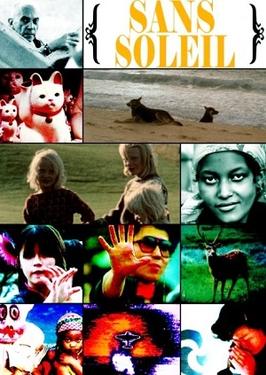
Sans Soleil is a 1983 French documentary film directed by Chris Marker. It is a meditation on the nature of human memory, showing the inability to recall the context and nuances of memory, and how, as a result, the perception of personal and global histories is affected. The title Sans Soleil is from the song cycle Sunless by Modest Mussorgsky, a brief fragment of which features in the film. Sans Soleil is composed of stock footage, clips from Japanese movies and shows, excerpts from other films as well as documentary footage shot by Marker.

Jeanne Dielman, 23 quai du Commerce, 1080 Bruxelles is a 1975 film written and directed by Belgian filmmaker Chantal Akerman. It was filmed over five weeks on location in Brussels, and financed through a $120,000 grant awarded by the Belgian government. Distinguished by its restrained pace, long takes, and static camerawork, the film is a slice of life depiction of a widowed housewife over the course of three days.

Faouzi Bensaïdi is a Moroccan film director, actor, screenwriter and artist. His film A Thousand Months was screened in the Un Certain Regard section at the 2003 Cannes Film Festival.
Nigel Andrews FRSA is a British film critic best known for being the long-time chief film critic of the Financial Times.
Geoff Andrew is a British writer and lecturer on film, and currently Programmer-at-large at BFI Southbank. Born in Northampton, he studied at Northampton Grammar School and went on to gain a First in Classics at King's College, Cambridge. Andrew was for some years a programmer at London's Electric Cinema in Notting Hill, and later became the editor and chief critic of the film section of Time Out magazine. In 1999, he was appointed Programmer of London's National Film Theatre.
The "Top 100 Greatest Films of All Time" is a list published every ten years by Sight and Sound according to worldwide opinion polls they conduct. They published the critics' list, based on 1,639 participating critics, programmers, curators, archivists and academics, and the directors' list, based on 480 directors and filmmakers. Sight and Sound, published by the British Film Institute, has conducted a poll of the greatest films every 10 years since 1952.
















